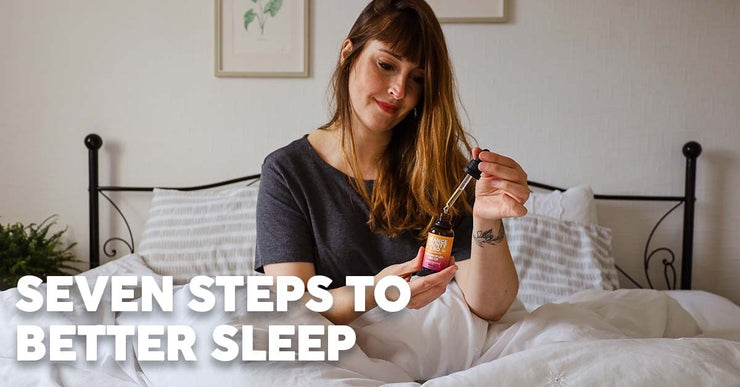7 Steps To Better Sleep


Sleep is a hugely important part of our health and wellbeing and there can be some serious medical and emotional consequences if we don’t get enough of it over a prolonged period.
Yet one in three people suffer from poor sleep, whether that’s not getting enough of it, or the quality of sleep being lower than it should be.
There are some medical conditions that can result in poor sleep but, for most of us, it’s usually down to unhelpful sleeping habits, and other factors can also have an impact, such as stress and anxiety.
We’ve compiled a range of tips that could help you to get to start enjoying a better quantity and quality of sleep.
Ensure you get access to some daylight each day
Everyone’s body has its own internal clock, known as a circadian rhythm. This is what tells us when we should be awake and asleep and it can get confused, especially if we don’t get enough daylight during waking hours.
Studies into people with insomnia have shown that getting natural daylight during the daytime can improve the quality and duration of sleep at night and also increase energy during the day.
It’s sometimes tough to do this, especially at certain times of the year when the days are short and the weather isn’t always something we want to be out and about in, but it can make a big difference just to take a short walk during daylight hours each day.
Alternatively, there are artificial sun lamps you can buy which mimic real sunlight.
Reduce blue light in the evenings
While getting plenty of light in the daytimes is really helpful for sleep, the opposite can be true when you take in lots of blue light in the lead up to bedtime, including on our phones, televisions, laptops or other devices.
This is because it tricks your body into thinking it’s still daytime and therefore not ready for sleeping yet. It’s recommended to use an app on your devices to block blue light and switch off your TV, along with any bright lights, at least a couple of hours before bed.
Don’t drink caffeine in the afternoons/evenings
Caffeine is a stimulant that many of us use frequently to help us wake up in the mornings, focus on something important or give us a little pick-me-up during the day.
However, caffeine can stay in our systems for around 6-8 hours, which means it can stop us from sleeping at bedtime or mean that our sleep isn’t as deep as it should be.
Depending on what time you go to bed, stopping drinking coffee or other caffeinated drinks about 6-8 hours earlier can help. For example, if you usually go to bed around 11pm, your last coffee should be no later than about 3-4pm. Need something warm before bed? Why not go with a CBD hot chocolate or a herbal tea instead!
Have a consistent bedtime and wake time
We might long for a weekend lie-in, but studies show that those with irregular sleep patterns e.g. staying up later at weekends and then sleeping in, can experience all-round poorer sleep on other nights too.
Going to bed and getting up at the same time every day can help keep your circadian rhythm on track and could mean you have more energy and feel more rested even if you have less sleep than if you’d had that lie-in.
Make your bedroom a sleep-focused environment
Things such as external noise or light can interrupt our sleep and having devices or screens in the bedroom can also have a negative impact on sleep quality.
If you have things such as children, partners or pets waking you up then there are some limits to what you can do about that, but you can use blackout blinds or curtains to make sure that no light is getting in through windows and make sure that your bedroom is a quiet, welcoming, cosy space that is kept at a good temperature for optimum sleep.
This can differ from person to person, but around 20 degrees Celsius is usually considered a good temperature for sleep for most people.
Having a comfortable bed/mattress and pillow is also important for helping you get the best possible sleep, with experts recommending a new mattress every 6-8 years.
Exercising during the day, but not too late
Getting in a good amount of exercise is known to help improve our sleep, as well as the other health benefits it brings.
Whether that’s a workout at home, a visit to the gym, a run or just a brisk walk, it can all help, but it’s important not to do it too close to bedtime as this can actually stop you from sleeping. This is because exercise stimulates the body and brain which can make us more alert and release hormones like adrenaline. Ideally, do your exercise earlier in the day or at least two hours before going to bed.
Try taking CBD
Whilst there is still more research to be done into the effects of CBD on the body and brain, early studies show promising signs in relation to potentially having a positive impact on sleep.
CBD is known to aid relaxation and this alone could help people to drift off to sleep more quickly than they otherwise might, but there are also many people who believe CBD helps support their sleep wake cycle, which we’ve already mentioned can have a big impact on how rested and rejuvenated you feel when you wake.
One of the great things about CBD is that there are multiple ways to take a daily dose of it, so there is something for everyone. From CBD oil drops in the mouth or added to a favourite food or drink, to CBD gummies for a tasty sweet snack in the evening, CBD muscle rub to apply topically after exercise or even a CBD bath bomb for the ultimate relaxing wind down before heading to bed.
You can find out more about CBD by reading our FAQs.
Sustainability